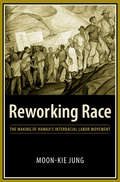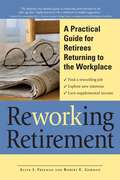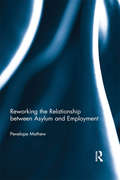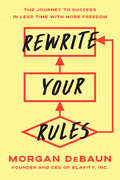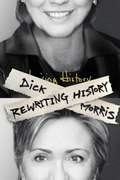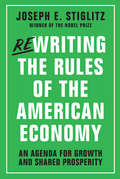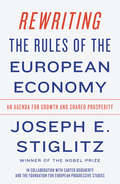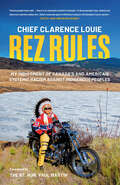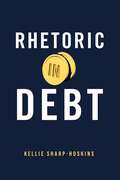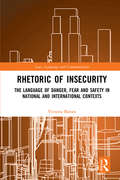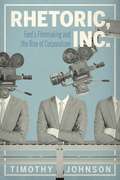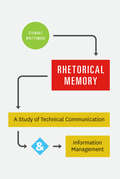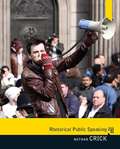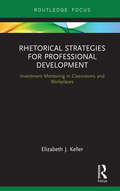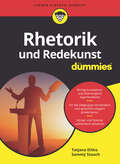- Table View
- List View
Reworking Office Space: Industry City, Brooklyn
by Arthur I Segel Nori Gerardo Lietz Charles F Wu Sid Yog Andrew BaumCase
Reworking Race: The Making of Hawaii's Interracial Labor Movement
by Moon-Kie JungIn the middle decades of the twentieth century, Hawai'i changed rapidly from a conservative oligarchy firmly controlled by a Euro-American elite to arguably the most progressive part of the United States. Spearheading the shift, tens of thousands of sugar, pineapple, and longshore workers eagerly joined the left-led International Longshoremen's and Warehousemen's Union (ILWU) and challenged their powerful employers.In this theoretically innovative study, Moon-Kie Jung explains how Filipinos, Japanese, Portuguese, and others overcame entrenched racial divisions and successfully mobilized a mass working-class movement. He overturns the unquestioned assumption that this interracial effort traded racial politics for class politics. Instead, he shows how the movement "reworked race" by developing an ideology of class that incorporated and rearticulated racial meanings and practices.Examining a wide range of sources, Jung delves into the chronically misunderstood prewar racisms and their imperial context, the "Big Five" corporations' concerted attempts to thwart unionization, the emergence of the ILWU, the role of the state, and the impact of World War II. Through its historical analysis, Reworking Race calls for a radical rethinking of interracial politics in theory and practice.
Reworking Retirement
by Allyn I. Freeman Robert E. GormanNow that you're retired, you finally have the chance to do a job you want to do-rather than one you have to do. Whether you are looking to earn a supplemental income or keep busy during your golden years with volunteer work, Reworking Retirement will help you successfully re-enter today's job market. Filled with expert advice, company case studies, and stories from other retirees returning to the workforce, this is your complete reference guide to post-retirement employment. It takes the difficulty out of finding, applying, and working a job while retired by teaching you how to: Capitalize on available job opportunities, Explore online, alternative, and volunteer career paths, Tailor your resume, cover letter, and pitch approriately, Transfer your skills into a different field, Succeed in your new work setting. Reworking Retirement takes the work out of finding a new career later in life . . . and promises to help make these years more fulfilling-personally and financially! Book jacket.
Reworking the Relationship between Asylum and Employment
by Penelope MathewTouching on the laws and practices of a wide array of countries around the globe, this book examines the extent to which refugees and asylum-seekers’ right to work is protected by international human rights law. The book examines a number of key international treaties, national constitutions and some foundational cases from national courts in order to make the case that the practise of restricting refugees and asylum-seekers access to the labour market is illegal. In so doing, the author examines some intricate legal questions, such as the interpretation of the Refugee Convention’s provisions restricting rights to refugees ‘lawfully staying’, the application of racial discrimination to citizenship distinctions, and the ways in which limitations on human rights are applicable in this context. The book also looks at some broader philosophical questions such as the meaning of equality and human dignity, and the legitimacy of the right to work. The book goes on to explore broader debates concerning migration and ‘open borders’ in order to unpack the fears that drive many countries’ restrictive measures. Readers are invited to consider whether the world would be a better place with more freedom of movement. It is a unique stand-alone treatment of the subject and includes the Michigan Guidelines on the Right to Work. Reworking the Relationship between Asylum-Seekers and Employment is written in an accessible style that will appeal to academics, policy-makers, practitioners and students. It combines a strong black-letter approach with a law in context approach that explains why the law takes its current shape and questions current orthodoxy.
Rewrite Your Rules: The Journey to Success in Less Time with More Freedom
by Morgan DeBaunWhat if the path to fulfillment isn&’t about doing more but redefining what matters most? Morgan DeBaun, the visionary founder and CEO of Blavity Inc., is here to help you become the CEO of your life and revolutionize your approach to success.&“With real-life stories and actionable advice, this book will inspire you to redefine success, take bold action, and build the life you deserve.&”—Tiffany Aliche, New York Times bestselling author of Get Good with MoneyIn her transformative book, Rewrite Your Rules, DeBaun delivers a powerful call to action: redefine the guiding principles of your life. This isn&’t about minor adjustments; it&’s about radically transforming what you believe is possible, challenging you to break free from societal expectations and design your own path.In Rewrite Your Rules, DeBaun doesn&’t just question the norms—she obliterates them. With the wisdom of a seasoned entrepreneur and the relatability of your most trusted friend, DeBaun offers a refreshing antidote to toxic hustle culture. Her powerful three-part framework will guide you to:● Master Yourself: Uncover your true values, passions, and potential.● Master Your Method: Align daily actions with your goals.● Master Your Growth: Adapt continuously to life&’s challenges and opportunities.Each chapter of the book provides practical steps for evaluating life&’s big questions and dismantling outdated rules. Whether rethinking your career, relationships, or routines, Rewrite Your Rules puts you firmly back in the driver&’s seat to focus on what matters most. This is a straight-talking resource you&’ll want to return to, at any stage, to build a life that feels truly yours—one that balances financial achievement with deep personal fulfillment. DeBaun proves that true success is rooted in authenticity, purpose, and the courage to chart your own course.
Rewriting History
by Dick Morris Eileen McgannConservative political annalist offers opinions on Hillary Clinton. Topics include Clinton's personality, money, hair style, intellect, and senate campaign.
Rewriting the Rules of the American Economy: An Agenda for Growth and Shared Prosperity
by Joseph E. StiglitzIt’s time to rewrite the rules—to curb the runaway flow of wealth to the top one percent, to restore security and opportunity for the middle class, and to foster stronger growth rooted in broadly shared prosperity. Inequality is a choice. The United States bills itself as the land of opportunity, a place where anyone can achieve success and a better life through hard work and determination. But the facts tell a different story—the U.S. today lags behind most other developed nations in measures of inequality and economic mobility. For decades, wages have stagnated for the majority of workers while economic gains have disproportionately gone to the top one percent. Education, housing, and health care—essential ingredients for individual success—are growing ever more expensive. Deeply rooted structural discrimination continues to hold down women and people of color, and more than one-fifth of all American children now live in poverty. These trends are on track to become even worse in the future. Some economists claim that today’s bleak conditions are inevitable consequences of market outcomes, globalization, and technological progress. If we want greater equality, they argue, we have to sacrifice growth. This is simply not true. American inequality is the result of misguided structural rules that actually constrict economic growth. We have stripped away worker protections and family support systems, created a tax system that rewards short-term gains over long-term investment, offered a de facto public safety net to too-big-to-fail financial institutions, and chosen monetary and fiscal policies that promote wealth over full employment.
Rewriting the Rules of the European Economy: An Agenda For Growth And Shared Prosperity
by Joseph E. StiglitzA companion to his acclaimed work in Rewriting the Rules of the American Economy, Joseph E. Stiglitz, along with Carter Dougherty and the Foundation for European Progressive Studies, lays out the economic framework for a Europe with faster growth that is more equitably shared. Europe is in crisis. Sluggish economic growth in many countries, widespread income stagnation, and recession have led to severe political and social consequences. Social protections for citizens have been cut back. Governments offer timid responses to deep-seated problems. These economic and political failures have contributed to the rise of extremist parties on the right. Marginalized populations are being made scapegoats for Europe’s woes. But the problems of today’s Europe stem from decisions based on a blind worship of markets in too many areas of policy. If Europe is to return to an innovative and dynamic economy—and if there is to be shared prosperity, social solidarity, and justice—then EU countries need to break with their current, destructive trajectory. This volume offers concrete strategies for renewal that would also reinvigorate the project of European integration, with fresh ideas in the areas of both macroeconomics and microeconomics, including central banking, public investment, corporate governance and competition policy, social policy, and international trade.
Reyem Affiar
by George WuReyem Affiar is interested in buying a condominium in Cambridge, Mass. Can data on previous condominium sales inform him on how to bid for the condo? The case includes 1990--1994 data on Cambridge condominium sales (nearly 500 records).
Reynolds Metals Co.: Consumer Products Division
by Samuel ChunReynolds Consumer Products Division must decide whether to discontinue its program of case allowances in favor of discretionary trade dollars targeted for market development.
Reynolds Space Constructors, Inc.
by Paul W. MarshallDeals with the use of critical path method for the construction of remote control building, which is part of a water purification system. Discusses the necessity of determining the shortest possible time in which a job could be done without spending more money. Case uses "activity on node" diagram. Based on Space Constructors Inc.
Rez Rules: My Indictment of Canada's and America's Systemic Racism Against Indigenous Peoples
by Chief Clarence LouieA common sense blueprint for what the future of First Nations should look like as told through the fascinating life and legacy of a remarkable leader.In 1984, at the age of twenty-four, Clarence Louie was elected Chief of the Osoyoos Indian Band in the Okanagan Valley. Nineteen elections later, Chief Louie has led his community for nearly four decades. The story of how the Osoyoos Indian Band—&“The Miracle in the Desert&”—transformed from a Rez that once struggled with poverty into an economically independent people is well-known. Guided by his years growing up on the Rez, Chief Louie believes that economic and business independence are key to self-sufficiency, reconciliation, and justice for First Nations people. In Rez Rules, Chief Louie writes about his youth in Osoyoos, from early mornings working in the vineyards, to playing and coaching sports, and attending a largely white school in Oliver, B.C. He remembers enrolling in the &“Native American Studies&” program at the Saskatchewan Indian Federated College in 1979 and falling in love with First Nations history. Learning about the historic significance of treaties was life-changing. He recalls his first involvement in activism: participating in a treaty bundle run across the country before embarking on a path of leadership. He and his band have worked hard to achieve economic growth and record levels of employment. Inspired by his ancestors&’ working culture, and by the young people on the reserve, Chief Louie continues to work for First Nations&’ self-sufficiency and independence. Direct and passionate, Chief Louie brings together wide-ranging subjects: life on the Rez, including Rez language and humour; per capita payments; the role of elected chiefs; the devastating impact of residential schools; the need to look to culture and ceremony for governance and guidance; the use of Indigenous names and logos by professional sports teams; his love for motorcycle honour rides; and what makes a good leader. He takes aim at systemic racism and examines the relationship between First Nations and colonial Canada and the United States, and sounds a call to action for First Nations to &“Indian Up!&” and &“never forget our past.&” Offering leadership lessons on and off the Rez, this memoir describes the fascinating life and legacy of a remarkable leader and provides a common-sense blueprint for the future of First Nations communities. In it, Chief Louie writes, &“Damn, I&’m lucky to be an Indian!&”
Rezessionsmanagement: Die Vorbereitung des Aufschwungs
by Hermut KormannRezessionen sind eine regelmäßige Erscheinung in einer Marktwirtschaft. Sie belasten ein Unternehmen in zweifacher Weise. Einmal muss sich das Unternehmen an den Rückgang der mengenmäßigen Nachfrage anpassen. Diese Anpassung führt zu einem - möglicherweise sehr hohen – Restrukturierungsaufwand. Hinzu kommt regelmäßig ein Druck auf das Preisniveau. Die Anpassungen der Aufwandsstrukturen an den Mengenrückgang allein genügen nicht. Es müssen zusätzlich – während der Rezession – produktivitätssteigernde Maßnahmen ergriffen werden. Nur so kann dem Preisdruck während der Rezession begegnet werden. Und nur so werden die Grundlagen gelegt, dass der Wiederaufschwung nach der Rezession ein „voller Erfolg“ für die Unternehmung wird. Denn: Das Geheimnis erfolgreichen Rezessionsmanagements liegt darin, Chancen für den nachfolgenden Wiederaufschwung vorzubereiten.
Rhetoric in Debt (RSA Series in Transdisciplinary Rhetoric)
by Kellie Sharp-HoskinsIn recent years, household indebtedness in the United States reached its highest levels in history. From mortgages to student loans, from credit card bills to US deficit spending, debt is widespread and increasing.Drawing on scholarship from economics, accounting, and critical rhetoric and social theory, Kellie Sharp-Hoskins critiques debt not as an economic indicator or a tool of finance but as a cultural system. Through case studies of the student-loan crisis, medical debt, and the abuses of municipal bonds, Sharp-Hoskins reveals that debt is a rhetorical construct entangled in broader systems of wealth, rule, and race. Perhaps more than any other social marker or symbol, the concept of “debt” indicates differences between wealthy and poor, productive and lazy, secure and risky, worthy and unworthy. Tracking the emergence and work of debt across temporal and spatial scales reveals how it exacerbates vulnerabilities and inequities under the rhetorical cover of individual, moral, and volitional calculation and equivalency.A new perspective on a serious problem facing our society, Rhetoric in Debt not only reveals how debt organizes our social and cultural relations but also provides a new conceptual framework for a more equitable world.
Rhetoric of Change
by Nitin Nohria Brooke HarringtonDescribes the ways in which managers communicate the need to change, specifically the way in which they use vision, crisis, and transition as rhetorical strategies to mobilize change. Also discusses strategies used by those trying to resist change, setting up what may be considered a rhetorical contest that determines whether change is embraced or not.
Rhetoric of InSecurity: The Language of Danger, Fear and Safety in National and International Contexts (Law, Language and Communication)
by Victoria BainesThis book demands that we question what we are told about security, using tools we have had for thousands of years. The work considers the history of security rhetoric in a number of distinct but related contexts, including the United States’ security strategy, the "war" on Big Tech, and current concerns such as cybersecurity. Focusing on the language of security discourse, it draws common threads from the ancient world to the present day and the near future. The book grounds recent comparisons of Donald Trump to the Emperor Nero in a linguistic evidence base. It examines the potential impact on society of policy-makers’ emphasis on the novelty of cybercrime, their likening of the internet to the Wild West, and their claims that criminals have "gone dark". It questions governments’ descriptions of technology companies in words normally reserved for terrorists, and asks who might benefit. Interdisciplinary in approach, the book builds on existing literature in the Humanities and Social Sciences, most notably studies on rhetoric in Greco-Roman texts, and on the articulation of security concerns in law, international relations, and public policy contexts. It adds value to this body of research by offering new points of comparison, and a fresh but tried and tested way of looking at problems that are often presented as unprecedented. It will be essential to legal and policy practitioners, students of Law, Politics, Media, and Classics, and all those interested in employing critical thinking.
Rhetoric, Inc.: Ford’s Filmmaking and the Rise of Corporatism (RSA Series in Transdisciplinary Rhetoric #15)
by Timothy JohnsonIn 1914, the Ford Motor Company opened its Motion Picture Laboratory, an in-house operation that produced motion pictures to educate its workforce and promote its products. Just six years later, Ford films had found their way into schools and newsreels, travelogues, and even feature films in theaters across the country. By 1961, it is estimated that the company’s movies had captured an audience of sixty-four million people.This study of Ford’s corporate film program traces its growth and rise in prominence in corporate America. Drawing on nearly three hundred hours of material produced between 1914 and 1954, Timothy Johnson chronicles the history of Ford’s filmmaking campaign and analyzes selected films, visual and narrative techniques, and genres. He shows how what began as a narrow educational initiative grew into a global marketing strategy that presented a vision not just of Ford or corporate culture but of American life more broadly. In these films, Johnson uncovers a powerful rhetoric that Ford used to influence American labor, corporate style, production practices, road building, suburbanization, and consumer culture. The company’s early and continued success led other corporations to adopt similar programs.Persuasive and thoroughly researched, Rhetoric, Inc. documents the role that imagery and messaging played in the formation of the modern American corporation and provides a glimpse into the cultural turn to the economy as a source of entertainment, value, and meaning.
Rhetoric, Inc.: Ford’s Filmmaking and the Rise of Corporatism (RSA Series in Transdisciplinary Rhetoric #15)
by Timothy JohnsonIn 1914, the Ford Motor Company opened its Motion Picture Laboratory, an in-house operation that produced motion pictures to educate its workforce and promote its products. Just six years later, Ford films had found their way into schools and newsreels, travelogues, and even feature films in theaters across the country. It is estimated that by 1961, the company’s movies had captured an audience of sixty-four million people.This study of Ford’s corporate film program traces its growth and rise in prominence in corporate America. Drawing on nearly three hundred hours of material produced between 1914 and 1954, Timothy Johnson chronicles the history of Ford’s filmmaking campaign and analyzes selected films, visual and narrative techniques, and genres. He shows how what began as a narrow educational initiative grew into a global marketing strategy that presented a vision not just of Ford or corporate culture but of American life more broadly. In these films, Johnson uncovers a powerful rhetoric that Ford used to influence American labor, corporate style, production practices, road building, suburbanization, and consumer culture. The company’s early and continued success led other corporations to adopt similar programs.Persuasive and thoroughly researched, Rhetoric, Inc. documents the role that imagery and messaging played in the formation of the modern American corporation and provides a glimpse into the cultural turn to the economy as a source of entertainment, value, and meaning.
Rhetorical Memory: A Study of Technical Communication and Information Management
by Stewart WhittemoreInstitutions have regimes--policies that typically come from the top down and are meant to align the efforts of workers with the goals and mission of an institution. Institutions also have practices--day-to-day behaviors performed by individual workers attempting to interpret the institution's missives. Taken as a whole, these form a company's memory regime, and they have a significant effect on how employees analyze, mix, translate, sort, filter, and repurpose everyday information in order to meet the demands of their jobs, their customers, their colleagues, and themselves. In Rhetorical Memory, Stewart Whittemore demonstrates that strategies we use to manage information--techniques often acquired through trial and error, rarely studied, and generally invisible to us--are as important to our success as the end products of our work. First, he situates information management within the larger field of rhetoric, showing that both are tied to purpose, audience, and situation. He then dives into an engaging and tightly focused workplace study, presenting three cases from a team of technical communicators making use of organizational memory during their everyday work. By examining which techniques succeed and which fail, Whittemore illuminates the challenges faced by technical communicators. He concludes with a number of practical strategies to better organize information, that will help employees, managers, and anyone else suffering from information overload.
Rhetorical Public Speaking
by Nathan CrickOffers students an advanced approach to public speaking through a comprehensive discussion of rhetorical theory This text begins by addressing Aristotle's "Five Canons of the Art"-a means of covering the basics through the lens of rhetorical theory- and progresses into a sophisticated outline of understanding, constructing and delivering artful rhetoric. The book incorporates scholarship on mediated communication, pragmatic speaking genres, the rhetorical situation, and aesthetic form. Rhetorical Public Speaking aims to encourage students to be engaged citizens of society. This text is available in a variety of formats - print and digital. Check your favorite digital provider for your etext, including Coursesmart, Kindle, Nook, and more. To learn more about our programs, pricing options and customization, click the Choices tab. Learning Goals Upon completing this book, readers will be able to: Understand Aristotle's Five Canons of Rhetoric Construct and execute speeches Explore how they can use rhetorical speech in their daily lives 0205943586 / 9780205943586 Rhetorical Public Speaking Plus MySearchLab with Pearson eText -- Access Card Package Package consists of: 0205239927 / 9780205239924 MySearchLab with Pearson eText -- Valuepack Access Card 020586936X / 9780205869367 Rhetorical Public Speaking
Rhetorical Strategies for Professional Development: Investment Mentoring in Classrooms and Workplaces (Routledge Research in Writing Studies)
by Elizabeth J. KellerThis book extends current research and scholarship around mentoring and learning theory, illustrating how mentoring creates, enacts, and sustains multidisciplinary learning in a variety of school, work, and community contexts. In so doing, it examines the relationship between teaching and mentoring, acknowledges the rhetorical invention of mentoring, and recognizes the intersection of gender identity (as a cultural and identity signifier or marker) and mentoring. It uses mentoring as a way to reimagine value-added approaches to research and teaching practices in rhetoric and composition.
Rhetorical Style and Bourgeois Virtue: Capitalism and Civil Society in the British Enlightenment (RSA Series in Transdisciplinary Rhetoric #2)
by Mark Garrett LongakerDuring the British Enlightenment, the correlation between effective communication and moral excellence was undisputed—so much so that rhetoric was taught as a means of instilling desirable values in students. In Rhetorical Style and Bourgeois Virtue, Mark Garrett Longaker explores the connections between rhetoric and ethics in the context of the history of capitalism. Longaker’s study lingers on four British intellectuals from the late seventeenth to the mid-nineteenth century: philosopher John Locke, political economist Adam Smith, rhetorical theorist Hugh Blair, and sociologist Herbert Spencer. Across one hundred and fifty years, these influential men sought to mold British students into good bourgeois citizens by teaching them the discursive habits of clarity, sincerity, moderation, and economy, all with one incontrovertible truth in mind: the free market requires virtuous participants in order to thrive. Through these four case studies—written as biographically focused yet socially attentive intellectual histories—Longaker portrays the British rhetorical tradition as beholden to the dual masters of ethics and economics, and he sheds new light on the deliberate intellectual engineering implicit in Enlightenment pedagogy.
Rhetorical Style and Bourgeois Virtue: Capitalism and Civil Society in the British Enlightenment (RSA Series in Transdisciplinary Rhetoric)
by Mark Garrett LongakerDuring the British Enlightenment, the correlation between effective communication and moral excellence was undisputed—so much so that rhetoric was taught as a means of instilling desirable values in students. In Rhetorical Style and Bourgeois Virtue, Mark Garrett Longaker explores the connections between rhetoric and ethics in the context of the history of capitalism. Longaker’s study lingers on four British intellectuals from the late seventeenth to the mid-nineteenth century: philosopher John Locke, political economist Adam Smith, rhetorical theorist Hugh Blair, and sociologist Herbert Spencer. Across one hundred and fifty years, these influential men sought to mold British students into good bourgeois citizens by teaching them the discursive habits of clarity, sincerity, moderation, and economy, all with one incontrovertible truth in mind: the free market requires virtuous participants in order to thrive. Through these four case studies—written as biographically focused yet socially attentive intellectual histories—Longaker portrays the British rhetorical tradition as beholden to the dual masters of ethics and economics, and he sheds new light on the deliberate intellectual engineering implicit in Enlightenment pedagogy.
Rhetorik für Finanz-Manager: Auftritt und Wirkung in der Finanzwirtschaft (Edition Bankmagazin)
by Stefanie EtzelDieser Band aus der Edition BANKMAGAZIN untersucht den öffentlichen Auftritt in der Finanzbranche. Schwerpunkt ist die Wirkungsanalyse von Rede und Antwort unter rhetorischen Gesichtspunkten: Welche Botschaften senden die Auftritte von Spitzenkräften der Kreditwirtschaft aus? Ob Präsentation der Geschäftszahlen vor den Aktionären, TV-Statement oder Festrede: Es zählt nicht nur der Inhalt, sondern auch die Form. Auftritte von Angehörigen der Finanzbranche unterscheiden sich mitunter deutlich von denen anderer Wirtschaftszweige. Im Branchenvergleich sind sie die am traditionellsten gekleideten, die am strengsten redenden und am diszipliniertesten antwortenden Personen.Was bedeutet das für die Vorbereitung des öffentlichen Auftritts? Lassen sich Disziplin und Stringenz mit Unterhaltungswert, mit Brillanz und Überzeugungskraft überein bringen? Das Werk bietet eine fundierte Bestandsaufnahme des öffentlichen Auftritts, Themensettings und der rhetorischen Vorbereitung in der Finanzbranche sowie praxisnahe Empfehlungen, um den Auftritt systematisch zu verbessern.Für die 2. Auflage wurde das Werk vollständig aktualisiert.
Rhetorik und Redekunst für Dummies (Für Dummies)
by Tatjana Ditko Sammy StauchMöchten auch Sie bei Ihrer nächsten Rede oder Präsentation authentisch vortragen, überzeugend argumentieren, rhetorisch geschickt formulieren und das Publikum begeistern? Dieses Buch beweist, dass auch Sie das können. Erfahren Sie, wie Sie Ihre Rede geschickt konzipieren und mit überzeugenden Argumenten und gut gewählten Worten punkten. Lernen Sie, entspannt vor Ihrem Publikum zu stehen und auch auf Zwischenfragen souverän reagieren zu können. Lassen Sie sich Tipps und Kniffe zeigen, wie Sie sich gut vorbereiten und beim Vortrag ganz präsent sind.

